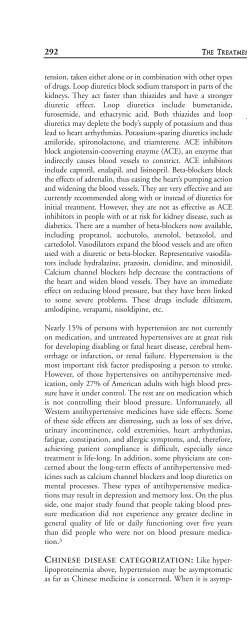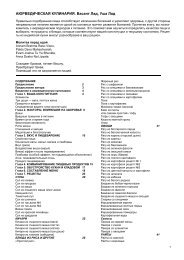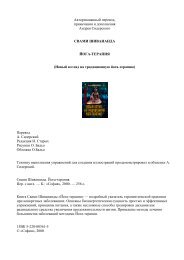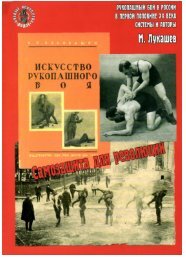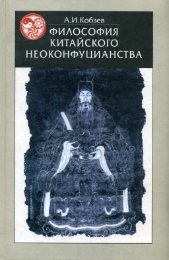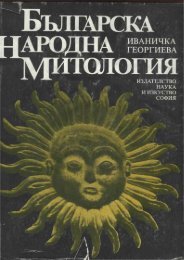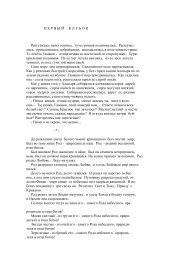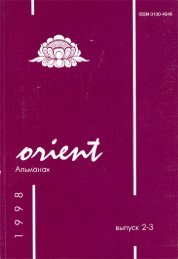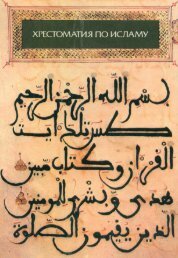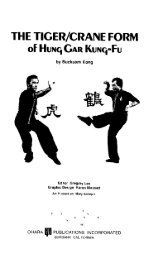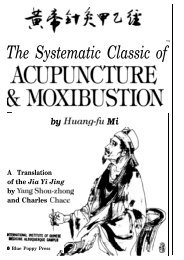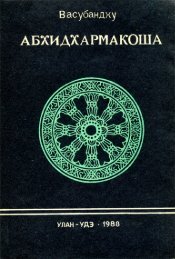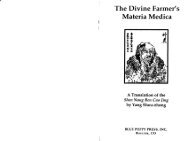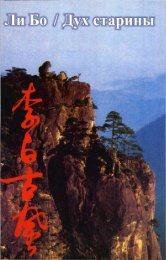The Treatment of Modern Western - Biblio.nhat-nam.ru
The Treatment of Modern Western - Biblio.nhat-nam.ru
The Treatment of Modern Western - Biblio.nhat-nam.ru
- No tags were found...
Create successful ePaper yourself
Turn your PDF publications into a flip-book with our unique Google optimized e-Paper software.
292 THE TREATMENT OF MODERN WESTERN DISEASES WITH CHINESE MEDICINEtension, taken either alone or in combination with other types<strong>of</strong> d<strong>ru</strong>gs. Loop diuretics block sodium transport in parts <strong>of</strong> thekidneys. <strong>The</strong>y act faster than thiazides and have a strongerdiuretic effect. Loop diuretics include bumetanide,furosemide, and ethacrynic acid. Both thiazides and loopdiuretics may deplete the body’s supply <strong>of</strong> potassium and thuslead to heart arrhythmias. Potassium-sparing diuretics includeamiloride, spironolactone, and triamterene. ACE inhibitorsblock angiotensin-converting enzyme (ACE), an enzyme thatindirectly causes blood vessels to constrict. ACE inhibitorsinclude captoril, enalapil, and lisinopril. Beta-blockers blockthe effects <strong>of</strong> adrenalin, thus easing the heart’s pumping actionand widening the blood vessels. <strong>The</strong>y are very effective and arecurrently recommended along with or instead <strong>of</strong> diuretics forinitial treatment. However, they are not as effective as ACEinhibitors in people with or at risk for kidney disease, such asdiabetics. <strong>The</strong>re are a number <strong>of</strong> beta-blockers now available,including propranol, acebutolo, atenolol, betaxolol, andcartedolol. Vasodilators expand the blood vessels and are <strong>of</strong>tenused with a diuretic or beta-blocker. Representative vasodilatorsinclude hydralazine, prazosin, clonidine, and minoxidil.Calcium channel blockers help decrease the contractions <strong>of</strong>the heart and widen blood vessels. <strong>The</strong>y have an immediateeffect on reducing blood pressure, but they have been linkedto some severe problems. <strong>The</strong>se d<strong>ru</strong>gs include diltiazem,amlodipine, verapami, nisoldipine, etc.Nearly 15% <strong>of</strong> persons with hypertension are not currentlyon medication, and untreated hypertensives are at great riskfor developing disabling or fatal heart disease, cerebral hemorrhageor infarction, or renal failure. Hypertension is themost important risk factor predisposing a person to stroke.However, <strong>of</strong> those hypertensives on antihypertensive medication,only 27% <strong>of</strong> American adults with high blood pressurehave it under control. <strong>The</strong> rest are on medication whichis not controlling their blood pressure. Unfortunately, all<strong>Western</strong> antihypertensive medicines have side effects. Some<strong>of</strong> these side effects are distressing, such as loss <strong>of</strong> sex drive,urinary incontinence, cold extremities, heart arrhythmias,fatigue, constipation, and allergic symptoms, and, therefore,achieving patient compliance is difficult, especially sincetreatment is life-long. In addition, some physicians are concernedabout the long-term effects <strong>of</strong> antihypertensive medicinessuch as calcium channel blockers and loop diuretics onmental processes. <strong>The</strong>se types <strong>of</strong> antihypertensive medicationsmay result in depression and memory loss. On the plusside, one major study found that people taking blood pressuremedication did not experience any greater decline ingeneral quality <strong>of</strong> life or daily functioning over five yearsthan did people who were not on blood pressure medication.3CHINESE DISEASE CATEGORIZATION: Like hyperlipoproteinemiaabove, hypertension may be asymptomaticas far as Chinese medicine is concerned. When it is asymptomatic,it does not correspond to any traditional Chinesedisease category. When hypertension is complicated and,therefore, there are signs and symptoms, it is mainly categorizedas tou tong, headache, tou zhang, head distention, xuanyun, dizziness, xin ji, heart palpitations, bu mian, insomnia,and ma mu, numbness and tingling.DISEASE CAUSES & MECHANISMS: Due to formerheaven natural endowment, people may be either habituallybodily exuberant or vacuous and insufficient. As the LingShu (Spiritual Axis) states: “[Due to] the unfavorable andfavorable [aspects <strong>of</strong>] the five body [types], it is said that people’sbone joints may be large or small, their flesh may befirm or fragile, their skin may be thick or thin, their bloodmay be clear or turbid, or their qi may be slippery or choppy. . .” <strong>The</strong>refore, some people have a predisposition to yangexuberance and phlegm dampness, while others are predisposedto yin vacuity. In addition, each person’s viscera andbowels have an innate tendency towards vacuity or repletion.On top <strong>of</strong> such habitual bodily predispositions, overeatingfatty, sweet, thick-flavored foods may damage the spleen andstomach, which then lose their control over movement andtransformation. This results in internal engenderment <strong>of</strong>phlegm dampness. Phlegm and dampness are yin depressionswhich may hinder and obst<strong>ru</strong>ct the free flow <strong>of</strong> qi, blood,and body fluids as well as confound and block the orifices <strong>of</strong>the heart and the upper clear orifices. If phlegm and dampnessblock the free flow <strong>of</strong> qi, blood, or body fluids, theremay be distention and pain, swelling and edema, and/ormalnourishment <strong>of</strong> the tissues and organs. In addition, itmay also give rise to transformative heat which may causeyang to become hyperactive and may damage and consumeyin. Other factors which may damage the spleen and lead tothe engenderment <strong>of</strong> phlegm and dampness are too littleexercise and too much thinking and worry.On the other hand, unfulfilled desires or anger may damagethe liver and cause it to lose its control over coursing and discharge.This may cause qi stagnation which may lead toblood stasis. It may cause transformative heat with its attendantyang hyperactivity and/or yin vacuity. And it may causeor aggravate damp accumulation and phlegm obst<strong>ru</strong>ction,since it is the qi which is responsible for moving and transformingboth <strong>of</strong> these. In addition, liver repletion usuallyresults in spleen vacuity since wood typically counterflowshorizontally to invade the spleen when it becomes depressed.Unfortunately, the sweet flavor relaxes the liver. <strong>The</strong>refore,people who are under emotional stress try to alleviate theirliver depression by eating sweets. Sweet is the flavor whichenters the spleen. In small amounts, it supplements thespleen, but in large amounts, it damages the spleen.<strong>The</strong>refore, a liver-spleen disharmony is <strong>of</strong>ten the underlyingimbalance predisposing one to this condition.In addition, aging plays a role in the disease mechanisms <strong>of</strong>


